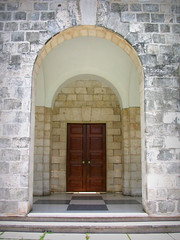
If you, like me, sometimes get bored with your first life let me introduce you to a virtual Second Life where you can create an avatar, attend an exhibit, share your favorite dance moves with other librarians at a live online party, listen to a conference presentation, ask a reference question, or if you are adventurous you can buy Linden dollars and purchase land to build your 'dream space'. All of these activites and more are available at Second Life which has been been described as a "3D virtual digital world imagined and created by its residence".
If you are unsure of what to do when you arrive in Second life you can teleport to Orientation Island and spend some time learning to use the interface and customizing your avatar. Try it, you may be surprised at who or what you bump into in Second Life!











